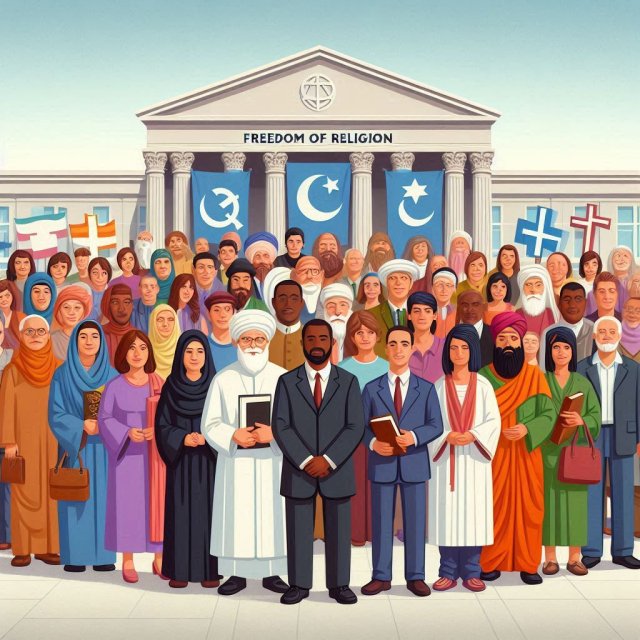Freedom of religion is a fundamental principle that guarantees individuals the right to practice their religion or belief without interference or persecution by the State or other actors. In Ecuador, this right is enshrined in the Constitution and other laws, but its application and protection vary depending on the political, social and cultural context of the country. In this article, we will explore freedom of religion in Ecuador in detail, examining its importance, its legal framework, the challenges it faces, and its impact on Ecuadorian society.
Importance of Freedom of Worship.
Freedom of religion is a fundamental principle in a democratic and pluralistic society, as it guarantees individuals the right to practice their religion or belief without fear of reprisals or discrimination. This right is fundamental to promoting religious diversity and religious tolerance in Ecuador, allowing people to freely express their beliefs and participate in religious practices without undue interference from the State or other individuals.
Legal Framework of Freedom of Worship in Ecuador.
In Ecuador, freedom of religion is enshrined in the Constitution, which guarantees all people the right to freedom of conscience and religion, as well as the right to practice their religion individually or collectively, publicly or privately, and to change of religion or belief at any time (Article 19). Furthermore, the Constitution prohibits discrimination on religious grounds and recognizes the equality of all religions and beliefs before the law. These constitutional provisions provide a solid legal framework for the protection and promotion of freedom of religion in Ecuador.
Challenges and Obstacles.
Despite the legal provisions that guarantee freedom of religion in Ecuador, there are a series of challenges and obstacles that can affect its full exercise in practice. One of the main challenges is the persistence of discrimination and religious intolerance in certain sectors of Ecuadorian society. Although the Constitution prohibits discrimination on religious grounds, in practice cases of prejudice and hostile attitudes towards certain minority or unrecognized religious communities can still be found.
Furthermore, the political and social influence of certain dominant religions can limit the freedom of worship of minority or unrecognized groups. Sometimes, this manifests itself through public policies or government decisions that favor certain religious denominations to the detriment of others, which can generate tensions and conflicts in society.
Another important challenge is the lack of awareness and education about the importance of freedom of worship and religious diversity in Ecuadorian society. Many people may not be aware of their rights in this area or may have misconceptions about certain religions or beliefs, which can contribute to discrimination and religious intolerance.
Furthermore, the lack of resources and institutional support can make it difficult to effectively protect and promote freedom of religion in Ecuador. Minority or unrecognized religious organizations may face difficulties in accessing public resources and services, which may affect their ability to practice their faith and participate fully in the religious and social life of the country.
Impact on Ecuadorian Society.
Freedom of religion has a significant impact on Ecuadorian society, as it promotes religious diversity, mutual respect and peaceful coexistence between people of different beliefs. By ensuring that all people have the right to practice their religion or belief freely, an environment of tolerance and religious pluralism is fostered in the country. This not only enriches the spiritual and cultural life of Ecuadorian society, but also contributes to the strengthening of democracy and human rights in the country.
Protection and Promotion of Freedom of Worship.
To protect and promote freedom of religion in Ecuador, it is essential that the government and public institutions take an active role in the defense of this fundamental right. This implies the adoption of effective measures to prevent and combat discrimination and religious intolerance in all its forms. A key strategy is the implementation of public policies that promote mutual respect, tolerance and interreligious dialogue in Ecuadorian society.
Furthermore, it is important to promote education in values of respect, tolerance and religious diversity in schools and society as a whole. This may include integrating religious education into the school curriculum, as well as conducting awareness-raising and training campaigns to promote respect for religious diversity and peaceful coexistence between people of different faiths.
Another important strategy is to encourage cooperation and dialogue between different religious communities in Ecuador. This can be facilitated through the creation of meeting and collaboration spaces where religious leaders and representatives of different faiths can meet to discuss issues of common interest and work together on mutually beneficial projects.
Furthermore, it is essential to ensure that all people have equal access to public resources and services, regardless of their religious affiliation. This includes access to education, health and other social services, as well as the right to participate in the political and social life of the country without discrimination on religious grounds.
Freedom of religion is a fundamental principle in Ecuador that guarantees all people the right to practice their religion or belief freely and without fear of reprisals. Although this right is enshrined in the Constitution and other laws, its full exercise faces a series of challenges and obstacles in practice. However, despite these challenges, freedom of religion remains crucial to promoting religious diversity, mutual respect and peaceful coexistence in Ecuadorian society. Through respect and protection of this fundamental right, Ecuador can move towards a more inclusive, tolerant and respectful society of religious diversity.
